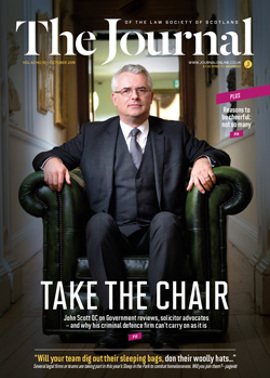Finding the right blend

Tracing its roots back to the early 19th century, Chivas Brothers is now a market-leading whisky producer. Its legal team talk about their role in delivering the Chivas brand to a global audience.
Tell us about the legal team at Chivas Brothers and your different roles?
There are 12 members of the Chivas Brothers Legal team, comprising eight solicitors, one paralegal, one trainee and two admin support. We are spread across three business locations between Scotland and England. Each of us is physically located close to the clients within the business that we support. This allows us to develop relationships within the business and to be part of the teams that make business decisions.
Although we each have specialisations, this is a flexible structure so that we can redistribute work among the team when required.
Between us, we have expertise in property, construction, engineering, IP, marketing, anti-counterfeit, IT, corporate restructuring, M&A, JVs, compliance, corporate governance, procurement, international distribution, outsourcing and logistics.
What are the main success factors for an in-house legal team like yours? How does the team measure success?
For Chivas Brothers Legal, success is ultimately positive, sustainable, commercial performance facilitated by efficient legal risk management and value creation. We achieve that success within our team and across our business.
We are lucky to have a diverse team with a broad range of legal experience, which equips us well to operate within a dynamic environment and resolve commercial challenges. With this experience and our collegiate approach to working with colleagues throughout our business and the wider international group, we form part of the teams that drive a successful business. Just as the wider business has achieved commercial success through innovation, our own team is focused on continuous improvement: by actively seeking feedback from our colleagues, exploring new ways to improve our service and by sharing best practice.
Chivas Brothers is part of global drinks giant Pernod Ricard. What’s it like working for such a large and international organisation?
Being part of a large business brings significant benefits in terms of resources and experience. Thanks to our scale, our team benefits from excellent IT resources and excellence in talent development – both through tailored internal training at Chivas Brothers and world-class training at Pernod Ricard University, our group’s dedicated facility near Paris.
The international aspect of our business creates a valuable opportunity to interact regularly with fellow legal practitioners across the globe – enabling our team to share best practice and benefit from local market knowledge.
It also creates beneficial opportunities for travel, including attending team meetings at our distilleries in Speyside, visiting our affiliate’s wineries in Spain and attending to brand protection matters in China.
What have you learned from working with legal colleagues across the globe?
Many of our projects involve co-ordination with legal teams in our affiliate companies; it would not be unusual for us to be involved in a single transaction that includes legal teams in France, the US, Spain, Canada, Australia, Sweden, the Netherlands, Ireland, Mexico and New Zealand. It is always interesting to see how other legal systems operate and solve problems in ways that meet the requirements of all jurisdictions involved. While this enables our team to adopt best practices developed by our international colleagues, it also highlights that, although Scotland is proportionately geographically smaller than many of our affiliates’ territories, we generate many valuable innovations within our group.
Do you use external legal advisers? If so, in what circumstances and what do you look for?
We have a panel of solicitors whom we instruct for support either on very specialist areas or at times when the volume of work exceeds the in-house team’s capacity. We look for people who are prepared to invest time in understanding our business and who will use that understanding to tailor the support they provide to our requirements and our ways of working. We also look for people who are prepared to help us take a commercial view.
All business decisions involve an element of risk, so it is not just advising on the law, but finding the safest way to do business.
There’s a perception that in-house legal teams want to embrace technology but face barriers to doing so. What is the team’s experience of using legal technology?
We are really lucky to have a high level of technological competence within our team and an innovative business culture that encourages technological development, rather than solely relying on external legal technological solutions. This has, for example, enabled us to develop automated legal documentation and to encourage our internal clients to become directly involved in the drafting process without risking the legal integrity of our contracts.
What else has the team done that is particularly innovative?
The legal, tax and finance teams are sometimes required to produce documentation to pay dividends through our complex structure back to our parent company in France. This involves drafting about 40 documents that contain a number of variables, reflected in about 100 numbers and expressed in three currencies.
To speed up the process for populating the documents on the release of the foreign exchange rates, the legal team produced software that facilitates automatic population of figures while circumventing the time-intensive step of manual population. This allows accurate final documents to be produced in 10 minutes, cutting support costs and minimising time spent checking documentation, thus providing maximum flexibility on timing for senior management to attend meetings to approve the transactions.
You’ve recently developed in-house traineeship and legal intern programmes. What was the impetus for this and what’s been your experience?
We have had four legal trainees over the last few years (in both England and Scotland). This has been very successful on a number of levels:
- the opportunity to retain good trainees post-qualification;
- enabling both legal and commercial skills development of our trainees during their traineeships, making them well suited to the role of an in-house lawyer;
- providing a cost-effective resource of highly motivated young lawyers;
- succession planning within the team;
- supporting diversity within the workforce.
Our legal intern programme was a response to requests for in-house experience from students. We look for students who can demonstrate their interest in pursuing a career in a commercial environment. We look for individuals who can communicate well and have elected to study commercially orientated subjects.
What advice would you give young lawyers who want to start a career in-house? What makes a good in-house lawyer?
Try to get some in-house experience to see if you enjoy it. Being in-house involves a willingness to tackle whatever problems may arise, and these may not always be strictly legal. We need to find practical solutions to problems and work with a wide range of other disciplines to do so.
The value offered to a business by an effective in-house lawyer lies not just in their knowledge of the law, but also in the application of a solicitor’s perspective to all areas of business.
In-house legal teams sometimes struggle with a relatively flat structure. How do you ensure there are adequate development opportunities for all of the team?
You need to be prepared to take a wider view of career opportunities in-house. These may not always be in the same jurisdiction or even in the legal function.
What are the key challenges for in-house legal teams? What does the future look like for in-house lawyers?
The key challenge is ensuring that the value they bring to business is recognised – which, in turn, requires continuous development as the business changes. The in-house market in Scotland is growing as businesses are recognising the value of legal skills being integrated within their teams – and in that regard, the future is bright for bright in-house Scots lawyers…
Finally, what do you love about your jobs?
- Every day is different.
- You make a real and tangible difference to business success.
- You can build really strong relationships with your business colleagues.
- You get the opportunity to
- see projects through from start to finish.
- There is no time recording, so you can judge what time should be allocated to a legal problem without overly worrying about the cost.
- You get to work with a wide range of interesting people from different disciplines and countries.
- You get to be involved in commercial decision making.
- You can take pride in your part in producing the company’s products.
- It’s great to go into a bar anywhere in the world, see our brands (for example Chivas, Glenlivet, Ballantine’s and Beefeater), and know that you have played a part in this.
In this issue
- Online and out of line
- Timing the test for detriment
- The power of conversation
- Making Scotland an ACE aware nation
- Reading for pleasure
- Opinion: Jane Mair
- Book reviews
- Profile: Amanda Davy
- President's column
- Round Scotland from A to Z
- People on the move
- When crime no longer pays
- Hold tight for Brexit
- Debt: finding the right formula
- The thick of it
- Fringe benefits boost conference appeal
- Private revolution
- Document Data Group Form Partnership with Law Pro
- Where have all the new firms gone?
- New specialist land registration practice launches
- Sentences in many guises
- Law firms: how to attract and retain the best talent
- Licensing Armageddon – again?
- Planning Bill changing shape
- HMRC called offside in referees case
- Powers of attorney: two essential practice points
- Better access to the law
- Finding the right blend
- Look out for AML certificate launch
- Public policy highlights
- Clients, care, competence and... cancer
- Practice rights and Brexit: working in the UK
- Claims of our age
- Ask Ash
- Paralegal pointers
- A sleep in the park






